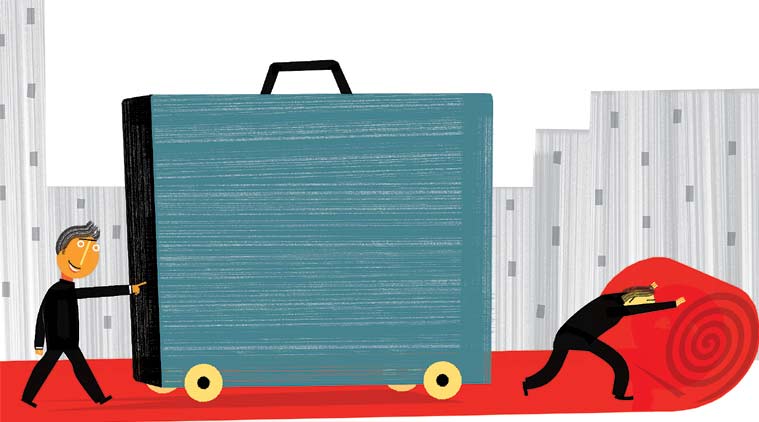 The state with the highest GDP, Maharashtra, was ranked 13th in the overall score. (Illustration: C R Sasikumar)
The state with the highest GDP, Maharashtra, was ranked 13th in the overall score. (Illustration: C R Sasikumar)
Maharashtra, the most industrialised state in the country, has been ranked 13th — below Gujarat, Andhra Pradesh, Madhya Pradesh, Haryana and Telangana, among others — in the ‘ease of doing business’ rankings. The Department of Industrial Policy and Promotion (DIPP), Ministry of Commerce, brought out the Assessment of States for the Business Reform Action Plan 2017 (BRAP), which gives the ease of doing business rankings for all states and Union territories, last month. The assessment was made by the World Bank in collaboration with the DIPP.
Andhra Pradesh got the top ranking. It was followed by Telangana, Haryana and Jharkhand. Andhra Pradesh, however, was ranked third in evidence score, a list topped by Jharkhand and Telangana with a 100 per cent score. Again, Andhra Pradesh scored the best on feedback with 86.5 per cent. Unlike in the overall and reform category, no state scored above 90 per cent in the feedback category. The importance of implementation of reforms on the ground is effectively captured, as the states’ scores on feedback reflect the discrepancy between reforms claimed as enacted and those actually made accessible to the users. The state with the highest GDP, Maharashtra, was ranked 13th in the overall score.
While Maharashtra has interest payments as a slight concern, it retains its position as the state that attracts the highest FDI and private investment. “The state has to work on the aspect of reform access, as it scores far too low compared with others on the feedback front. Given persistent revenue deficits there would always be pressure to compensate for this imbalance, which can affect capital expenditure (capex),” Care Ratings said.
Maharashtra had a revenue deficit of Rs 14,843 crore for 2017-18 — third highest revenue deficit after UP (Rs 18.515 crore) and Tamil Nadu (Rs 18,370 crore). “Andhra Pradesh, which ranks first, shows a high Debt to GSDP ratio of around 28 per cent and a revenue deficit of Rs 4,000 crore. The same goes with Haryana ranked third, which has a revenue deficit twice as much as Andhra. Thus a fiscal push is likely to be more challenging as both have interest to revenue ratios above the FRBM (Fiscal Responsibility and Budget Management) mandate of 10 per cent. They would have to persevere with reforms to get in more private investment,” it said